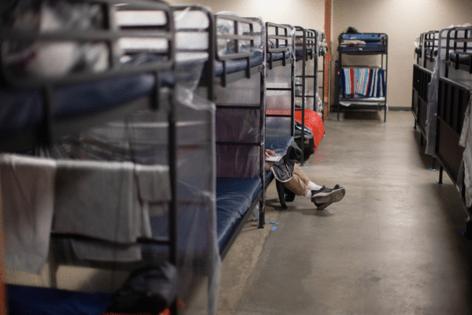California now requires cities to inspect all local homeless shelters
Published in News & Features
SAN JOSE, Calif. — As California spends unprecedented billions of dollars to bring homeless people off the street, state lawmakers quietly approved new rules this summer requiring local governments to complete annual health and safety inspections of all publicly funded homeless shelters and report the results.
If cities and counties fail to take steps to fix problems identified at local shelters or decline to submit the mandated reports, they could lose funding or face civil lawsuits from the state.
Homeless people frequently complain about substandard living conditions at shelters, which can be understaffed and sometimes struggle to accommodate residents with mental health and addiction issues.
Assemblymember Sharon Quirk-Silva, a Democrat representing Los Angeles and Orange counties, pushed for the inspection requirements after reading news stories and an American Civil Liberties Union investigation that found reports of violence, sexual harassment, maggot infestations, overflowing sewage and other serious problems at shelters in her district.
“We saw a lack of effort at first with even considering building shelters, and now that we have them, the next step is, how do we enforce the best-case scenario for those who are living there?” Quirk-Silva said.
Over the past decade, California has expanded its shelter capacity by more than 70% to some 76,000 year-round beds, according to federal data. Still, most cities and counties lack anywhere near enough shelter space for everyone on the street. And given the state’s severe shortage of affordable housing, those staying in what are supposed to be temporary shelters often struggle to find permanent homes.
The state has roughly 187,000 homeless residents, according to the latest estimate, and only about a third have a shelter bed on a given night.
In the Bay Area, San Jose has around 1,300 city-contracted shelter beds, excluding beds overseen by Santa Clara County but located within city limits, according to city officials. They said the city already has a three-person inspection team and is “working with the City Attorney’s Office on how best to meet our obligations within the law.”
Santa Clara County officials said that they are aware of two homeless shelters located in unincorporated areas within the county’s jurisdiction. They said the county’s planning department will work with the Fire Marshal to conduct inspections.
Alameda County’s health department, which oversees local homelessness programs, said it’s exploring next steps “since implementation will require coordination with various county and city partners.”
Oakland officials did not respond to questions about how the city would comply with the new rules.
The shelter inspection requirements are tucked deep within a “trailer bill” attached to the latest state budget, which lawmakers approved at the end of June.
Initially, Quirk-Silva had introduced a standalone homeless shelter bill. But as the deadline to approve the state budget approached, she persuaded Democratic party leaders to include the inspection requirements in the trailer bill. That legislation also contains dozens of other housing reforms, such as exempting most apartment construction from the state’s environmental review process.
It’s not uncommon for lawmakers to make last-minute additions to trailer bills connected to the state budget. Critics argue the practice enables legislators to enact laws through back-room deals without holding formal hearings or seeking public input.
Quirk-Silva said she received almost no pushback on the initial shelter bill and that the purpose of including the inspection requirements in the trailer bill was to ensure they became law as soon as possible.
The new rules build upon a 2021 law authored by Quirk-Silva that sought to compel local governments to inspect shelters where residents lodged complaints, ensure operators corrected any violations, and report the progress to the state housing department. The news publication CalMatters, however, found that few cities and counties have complied with the law.
The latest legislation aims to bolster enforcement of the expanded inspection and reporting mandates by empowering the California Department of Housing and Community Development to withhold funding and bring civil action against noncompliant cities and counties. Additionally, the new law requires shelter operators to inform residents on how to lodge complaints with officials.
Divya Shiv, a senior policy advocate with the advocacy group Housing California, which helped draft the bill’s language, said the state housing department must prioritize enforcing the new requirements for them to have an impact. In an email, the department said it plans to release guidance in the coming weeks “that will clarify the new responsibilities for local agencies and HCD’s role.”
“Success does lie in the implementation of the bill, but having the bill in the first place is a huge step in the right direction,” Shiv said.
Meanwhile, a separate trailer bill lawmakers approved in June includes additional requirements cities and counties must satisfy to receive state homelessness funding. That includes having a state-approved homebuilding plan and “demonstrating urgency and measurable results in housing and homelessness prevention.”
Some local officials have petitioned lawmakers to amend those provisions, arguing they are onerous and could lead to funding delays that would hinder efforts to combat homelessness.
©2025 MediaNews Group, Inc. Visit at mercurynews.com. Distributed by Tribune Content Agency, LLC.







Comments